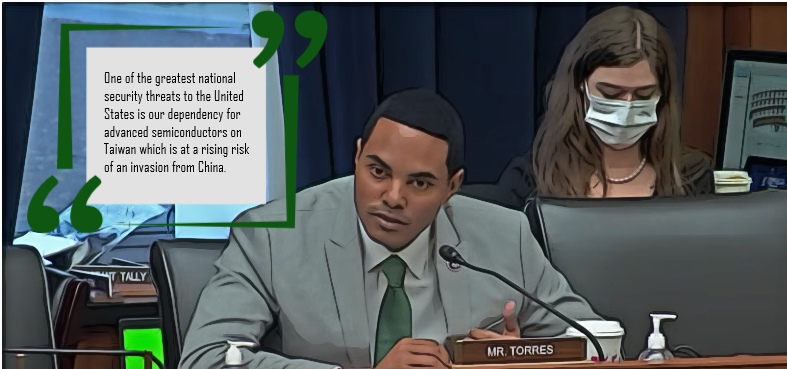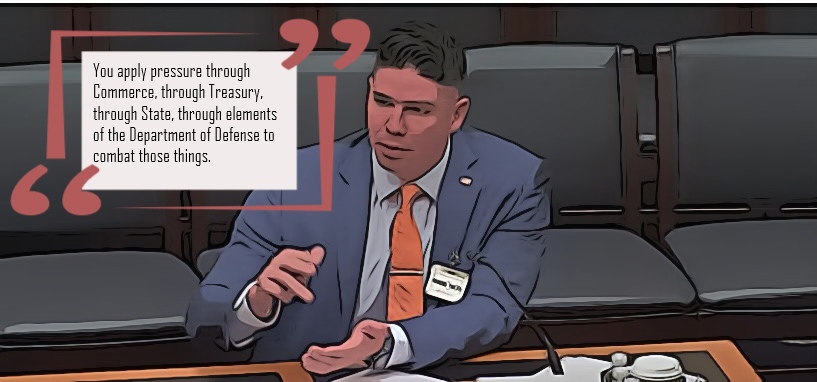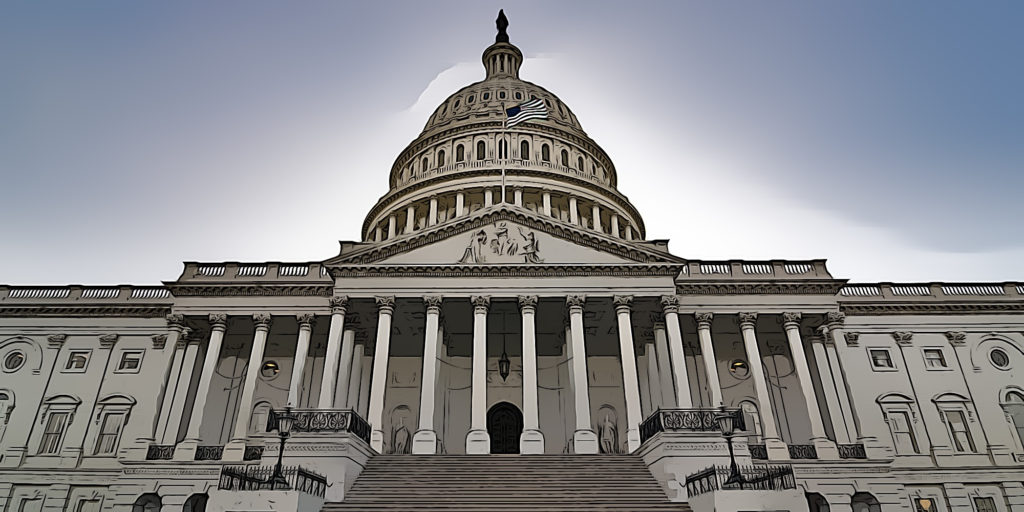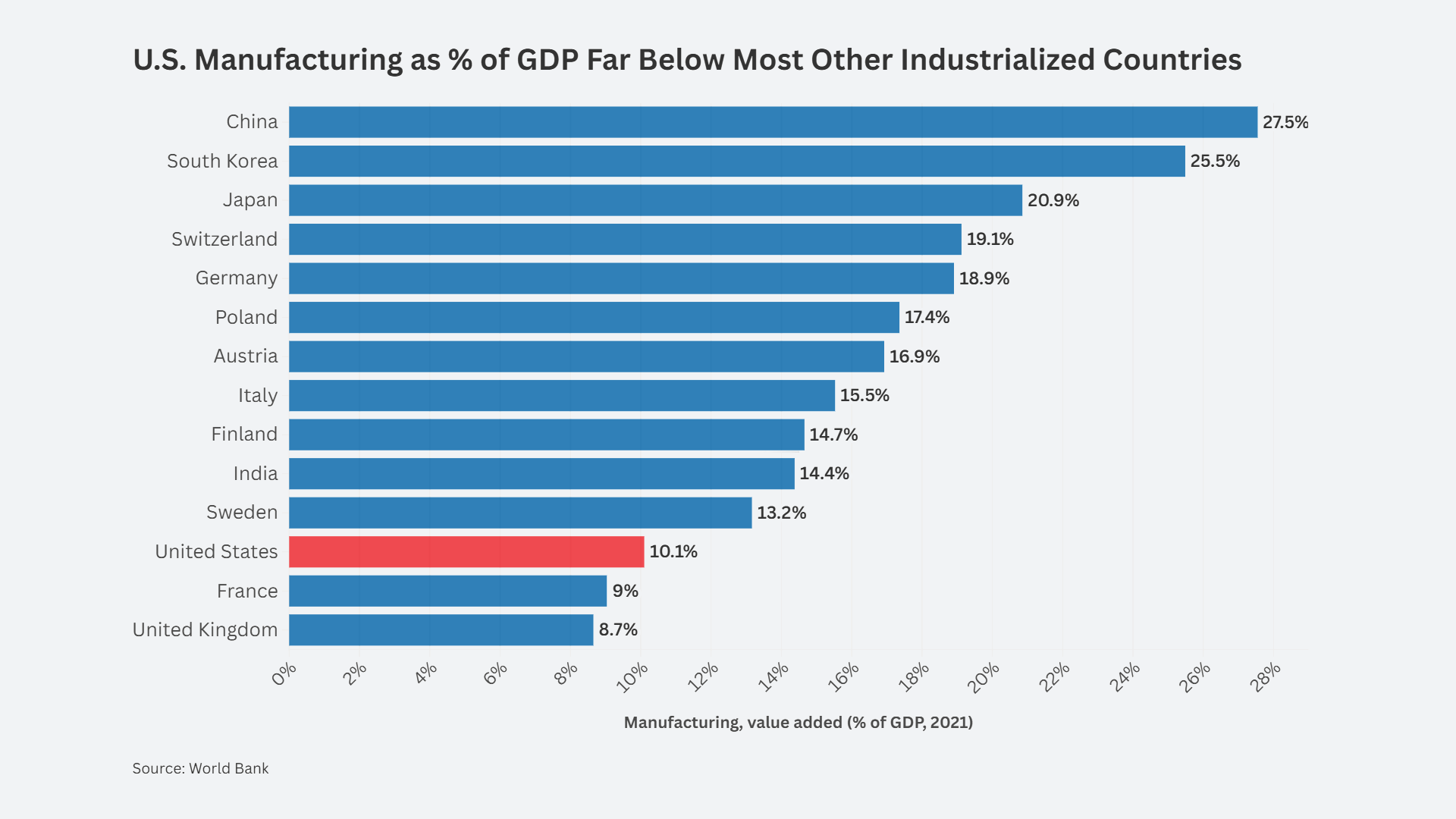A House Financial Services subcommittee heard from four witnesses on Thursday to discuss two issues: how to better detour or stop illicit natural resources from showing up in American supply chains. And wargaming out a scenario where China makes resource power grabs from Afghanistan to Taiwan.
Rep. Andy Barr (R-KY-6) brought up China and the Congo – home to most of the cobalt that goes into battery-powered cars. He also spoke about the latest issue for China hawks – the CCP’s interest in Afghanistan’s natural resources.
“Our adversaries are relied upon to provide us with the raw materials we need, and this is one example of where the climate goals of this administration directly conflict with our national security needs,” Barr said in reference to concerns that China may eventually gain control of Afghanistan lithium and rare earths like neodymium, a magnetic metal used in GPS systems.
See CPA’s letter to the White House on this issue, sent in August.
The hearing, titled “From Timber to Tungsten: How the Exploitation of Natural Resources Funds Rogue Organizations and Regimes” was held by the Financial Service Committee’s Subcommittee on National Security, International Development, and Monetary Policy. The hearing was about what Washington can do to counter illicit trade and the long-term consequences of illicit resource extraction by adversarial nations.
While not all of it was China-related — some of the issues discussed by witnesses centered on illegally forested timber in Peru, for example, where illegal logging is often done with a wink and a smile from government officials.
Rep. French Hill (R-AR-2) summed up the difficulty of the task at hand. “It is hard to combat any of this when it is the country’s leadership themselves that is facilitating it,” he said. “It’s endemic.”
Still, the biggest hot button issue of the day was China and Taiwan with one of the more interesting exchanges occurring between Rep. Ritchie Torres (D-NY-15) and witness Joshua Fruth, Chief Strategy Officer at Section 2 Financial Intelligence Solutions.
 Torres said he felt that China was facing a demographic crisis and could “become more provocative and desperate over time.”
Torres said he felt that China was facing a demographic crisis and could “become more provocative and desperate over time.”
Fruth: They want to seize Taiwan for the semis and the silicon, both.
Torres: How do we address it because it’s not clear to me what the solution is.
 Torres directed his next question towards another witness — Channing Mavrellis, Illicit Trade Director at Global Financial Integrity: do American businesses know their supply chains well enough? “If you’re an American business and you find out that your supply chain is entangled in illegal natural resource extraction, what are your legal obligations? Are most businesses even aware of their entanglements?
Torres directed his next question towards another witness — Channing Mavrellis, Illicit Trade Director at Global Financial Integrity: do American businesses know their supply chains well enough? “If you’re an American business and you find out that your supply chain is entangled in illegal natural resource extraction, what are your legal obligations? Are most businesses even aware of their entanglements?
Mavrellis: There are companies who chose to do this and there are those who don’t know what they’re getting involved in.
Rep. Warren Davidson (R-OH-8) showed signs of frustration, along with Congressman Hill who expressed similar feelings later in the hearing. The task was too large. Every government department has its own way of tackling the issue. It’s all Balkanized, or “siloed” as they described it.
He said Washington was not focused on the problem at hand. “If you want to solve a problem, generally you need to align responsibility, authority and accountability. We have to do that within our government with an all-of-government approach, whether that is in dealing with China alone, or illicit finance, for example.” He gave an example of how the Obama administration was able to act against the illegal smuggling of oil out of Syria to fund ISIS.
Fruth said that the Financial Crimes Enforcement Network, a bureau within the Treasury Department, was “underutilized as an asset on trade-based money laundering.”
Rep. Maxine Waters, who chairs the overall House Financial Services Committee, asked witnesses for advice on making sure shell companies weren’t being used to put a pretty face on an illicit or sanctioned operation.
Mavrellis said FinCEN should expand its reach to include sole proprietorships, trusts, foundations, and business associations. “The need to have a wide definition so no entities fall through the cracks,” she said.
Chairman Jim Himes (D-CT-4) said consumers can drive some change. He highlighted clean supply chains in things like electric vehicles. “What can we do in Congress, or more broadly as a society, to raise awareness in how we may tamper down this illegal trade?” he asked.
Kidan Araya, member of the Illicit Trafficking Working Group at the Women of Color for Advancing Peace and Security, said most people have no idea what’s going on in global supply chains involving natural resources. That includes the natural resources that power your Tesla.
“You have to just celebrate companies that are doing the right thing and are transparent in their supply chain,” she suggested. “It’s something that Congress should uplift. Let people know that these are the companies that we should want to do business with.”
American consumers have an immense amount of power. It was consumers that turned the organic foods movement into an industry and were behind the fair-trade movement in commodities like coffee beans sourced from Latin America. Advocates against brutal African diamond mining conditions were made infamous in movies and educated consumers who later began inquiring about where their diamond rings were coming from.
Moreover, the Customs and Border Protection Agency has done its part in banning illicit goods from American supply chains to the best of its ability making China’s treatment of the Uyghurs so famous that it recently got the Boston Celtics banned from selling its merchandise in NBA-loving China due to a player on the team named Enes Kanter who called the CCP out for its Muslim prison/labor camps in Xinjiang.













